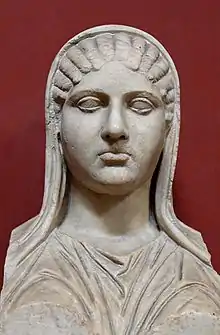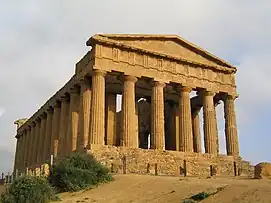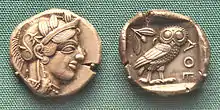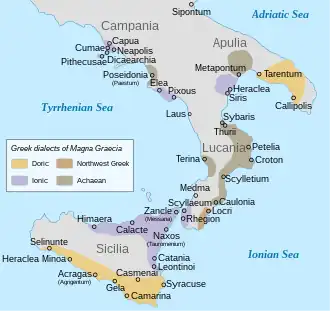The Ancient Greece Portal
Ancient Greece (Greek: Ἑλλάς, romanized: Hellás) was a northeastern Mediterranean civilization, existing from the Greek Dark Ages of the 12th–9th centuries BC to the end of classical antiquity (c. 600 AD), that comprised a loose collection of culturally and linguistically related city-states and other territories. Most of these regions were officially unified only once, for 13 years, under Alexander the Great's empire from 336 to 323 BC. In Western history, the era of classical antiquity was immediately followed by the Early Middle Ages and the Byzantine period.
Three centuries after the Late Bronze Age collapse of Mycenaean Greece, Greek urban poleis began to form in the 8th century BC, ushering in the Archaic period and the colonization of the Mediterranean Basin. This was followed by the age of Classical Greece, from the Greco-Persian Wars to the 5th to 4th centuries BC, and which included the Golden Age of Athens. The conquests of Alexander the Great spread Hellenistic civilization from the western Mediterranean to Central Asia. The Hellenistic period ended with the conquest of the eastern Mediterranean world by the Roman Republic, and the annexation of the Roman province of Macedonia in Roman Greece, and later the province of Achaea during the Roman Empire.
Classical Greek culture, especially philosophy, had a powerful influence on ancient Rome, which carried a version of it throughout the Mediterranean and much of Europe. For this reason, Classical Greece is generally considered the cradle of Western civilization, the seminal culture from which the modern West derives many of its founding archetypes and ideas in politics, philosophy, science, and art. (Full article...)
Selected article -

The Altar of the Twelve Gods (also called the Sanctuary of the Twelve Gods), was an important altar and sanctuary at Athens, located in the northwest corner of the Classical Agora. The Altar was set up by Pisistratus the Younger, (the grandson of the tyrant Pisistratus) during his archonship, in 522/1 BC. It marked the central point from which distances from Athens were measured and was a place of supplication and refuge.
The exact identities of the twelve gods to whom the Altar was dedicated is uncertain, but they were most likely substantially the same as the twelve Olympian gods represented on the east frieze of the Parthenon: Zeus, Hera, Poseidon, Demeter, Apollo, Artemis, Hephaestus, Athena, Ares, Aphrodite, Hermes, and Dionysus, though there are reasons to suppose that Hestia may have been one of the twelve. (Full article...)Selected location -
Stratos (Greek: Στράτος, Latin: Stratus) is a settlement in central Aetolia-Acarnania, Western Greece. It is best known for its remains of the namesake ancient Greek city and capital of Acarnania, which lie on a hillside about 500m north of the modern village.
Stratos is situated on the right bank of the river Acheloos, 9 km northwest of the town of Agrinio. The area north of Stratos is mountainous, whereas the south is flat. It is now an Aromanian (Vlach) village and a municipal unit of the Agrinio municipality. (Full article...)Did you know...
- ... that the Greeks did not have a term for "religion"?
- ... that Ancient Greek cuisine was characterized by its frugality, reflecting agricultural hardship?
- ... that the economy of ancient Greece was characterized by the extreme importance of agriculture, all the more so because of the relative poverty of Greece's soil?
Related portals
Selected biography -

Aspasia (/æˈspeɪʒ(i)ə, -ziə, -ʃə/; Greek: Ἀσπασία Greek: [aspasíaː]; c. 470 – after 428 BC) was a metic woman in Classical Athens. Born in Miletus, she moved to Athens and began a relationship with the statesman Pericles, with whom she had a son, Pericles the Younger. According to the traditional historical narrative, she worked as a courtesan and was tried for asebeia (impiety), though modern scholars have questioned the factual basis for either of these claims, which both derive from ancient comedy. Though Aspasia is one of the best-attested women from the Greco-Roman world, and the most important woman in the history of fifth-century Athens, almost nothing is certain about her life.
Aspasia was portrayed in Old Comedy as a prostitute and madam, and in ancient philosophy as a teacher and rhetorician. She has continued to be a subject of both visual and literary artists until the present. From the twentieth century, she has been portrayed as both a sexualised and sexually liberated woman, and as a feminist role model fighting for women's rights in ancient Athens. (Full article...)List of selected biographies |
|---|
General images -
Selected picture

Photo credit: Jastrow
The Parthenon Frieze is the low relief, pentelic marble sculpture created to adorn the upper part of the Parthenon’s naos. It was sculpted between ca. 443 and 438 BC most likely under the direction of Phidias. 420 ft of the original frieze survives, some 80%, the rest is known only from the drawings made by flemish artist Jacques Carrey in 1674 if at all.
Topics
Life: Agriculture · Art · Cuisine · Democracy · Economy · Language · Law · Medicine · Paideia · Pederasty · Pottery · Prostitution · Slavery · Technology · Olympic Games
Philosophers: Pythagoras · Heraclitus · Parmenides · Protagoras · Empedocles · Democritus · Socrates · Plato · Aristotle · Zeno · Epicurus
Authors: Homer · Hesiod · Pindar · Sappho · Aeschylus · Sophocles · Euripides · Aristophanes · Menander · Herodotus · Thucydides · Xenophon · Plutarch · Lucian · Polybius · Aesop
Buildings: Parthenon · Temple of Artemis · Acropolis · Ancient Agora · Arch of Hadrian · Temple of Zeus at Olympia · Colossus of Rhodes · Temple of Hephaestus · Samothrace temple complex
Chronology: Aegean civilization · Minoan Civilization · Mycenaean civilization · Greek dark ages · Classical Greece · Hellenistic Greece · Roman Greece
People of Note: Alexander The Great · Lycurgus · Pericles · Alcibiades · Demosthenes · Themistocles · Archimedes · Hippocrates
Art and Sculpture: Kouroi · Korai · Kritios Boy · Doryphoros · Statue of Zeus · Discobolos · Aphrodite of Knidos · Laocoön · Phidias · Euphronios · Polykleitos · Myron · Parthenon Frieze · Praxiteles
Subcategories
WikiProjects
- Wikipedia:WikiProject Greece
- Wikipedia:WikiProject Classical Greece and Rome
Things to do
 |
Here are some tasks awaiting attention:
|
Associated Wikimedia
The following Wikimedia Foundation sister projects provide more on this subject:
-
 Commons
Commons
Free media repository -
 Wikibooks
Wikibooks
Free textbooks and manuals -
 Wikidata
Wikidata
Free knowledge base -
 Wikinews
Wikinews
Free-content news -
 Wikiquote
Wikiquote
Collection of quotations -
 Wikisource
Wikisource
Free-content library -
 Wikiversity
Wikiversity
Free learning tools -
 Wiktionary
Wiktionary
Dictionary and thesaurus
-
 List of all portals
List of all portals -

-

-

-

-

-

-

-

-

-
 Random portal
Random portal -
 WikiProject Portals
WikiProject Portals
.jpg.webp)














.jpg.webp)














.JPG.webp)
.jpg.webp)
